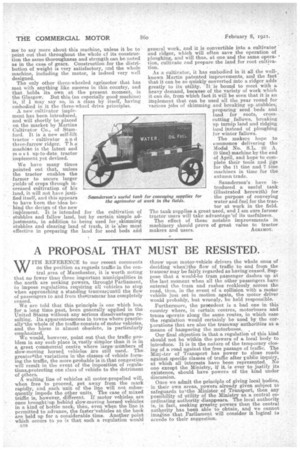A PROPOSAL THAT MUST BE RESISTED.
Page 26

If you've noticed an error in this article please click here to report it so we can fix it.
ITH REFERENCE to our recent comments on the position as regards traffic in the central area of Manchester, it is worth noting that no fewer than three important Municipalities in • the north are seeking powers, through Parliament, to impose regulations requiring all vehicles to stop when approaching a standing tramearmntil the flow of passengers to and from thestramear has completely ceased.
We are told that this principle is One which has, for a long time past, been generally applied in the United Statep without any serious disadvantages resulting. Its apparent#success in towns wherepracticallY-the whale of the traffic consists of motor vehicles, and the horse is almost obsolete, is particularly emphasized:
We would, however, point out that the traffic is in any suchplace is,vastly simpler than it s in a great commercial centre where large-niimbers of slow-moving horsed vehicles are still used.The. greaterothe variations in the classesof vehicle forming the traffic, the more probableis it that congestion will result in the event of the imposition of regulations,proteeting one class of vehicle to the detriment of ethers.
A waiting'. line of vehicles all motor-propelled will, when free to proceed, get away from the mark rapidly, and, each unit of the line will not subsequently impede the other units. The ease of mixed traffic is, however, different. If motor vehicles are once broughtlup behind slow-moving horsed vehicles in a kind of bottle neck, then even when the line is permitted to advance, the fasier'vehicles at the back are held up for a considerable time. Another point which occurs to us is that such a regulation would throw upon motor-vehicle drivers the whole onus of deciding wherOthe flow of traffic to and from the tramcar may be fairly regarded as having ceased. Suppose that a would-be tram passenger dashes up at the last moment when all the Other passengers have entered the train and rushes recklessly. across the road, then, in the event of a collision with a motor vehicle just set in motion again, the motor driver would probably, but wrongly, be held responsible.
Furthermore, the precedent is a bad one in this country where, in certain centres, motorbuses and trams operate along the same routes, in which case the regulation would certainly be used by the corporations that are also the tramway authorities as a means of hampering the motorbuses. , Our final objection is that a regulation of this kind should not be within the powers of a local body to introduce. It is in the nature of the temporary closing of a road against the free passage of traffic. The Minister of Transport has power to close roads against specific classes of traffic after public inquiry, at which all interests have been represented. No one except the Ministry, if it, is ever to justify its existence, should. have powers of the kind under discussion.
Once we admit the principle of giving local bodies, in their own areas, powers already given subject to safeguards tozthe Minister of Transport, then any possibility of utility of the Ministry as a central coordinating authority disappears. The local authority is, in fact, seeking greater powers than the central authority has been able to obtain, and we cannot imagine that Parliament will consider it logical to accede to their suggestion.






























